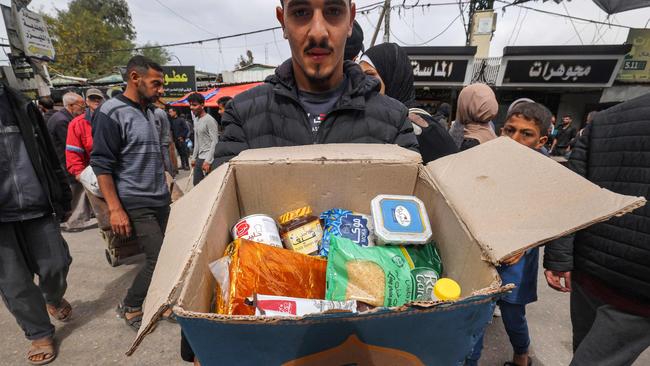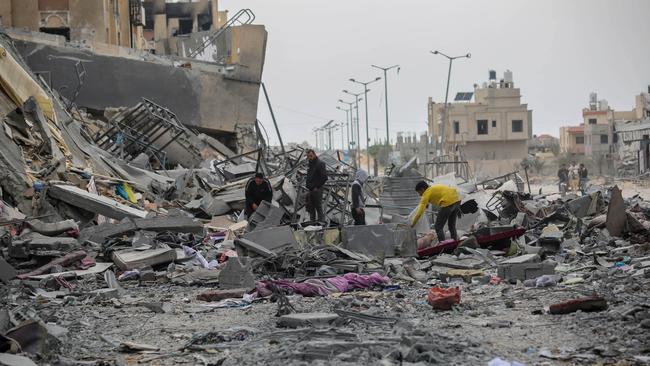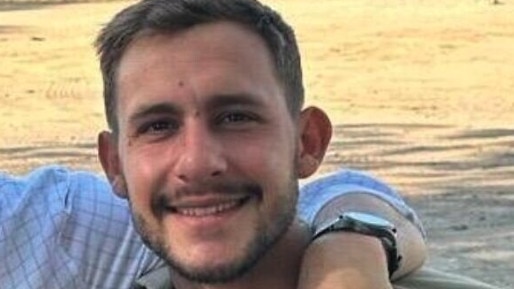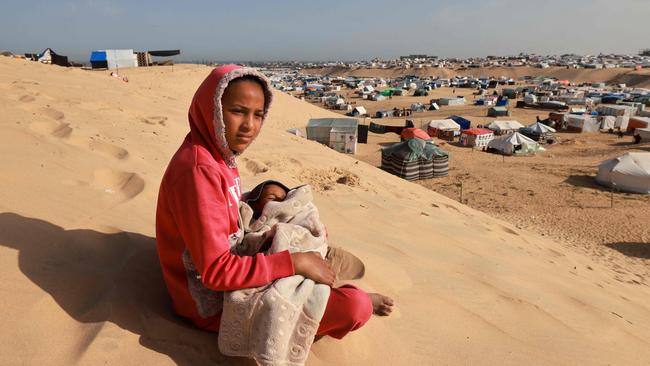Israeli army hunts for Hamas terrorists around Gaza hospital
The Israeli army launched an operation around Gaza’s largest hospital on Monday in search of Hamas fighters.

Heavy fighting raged Monday in and around Gaza’s largest hospital complex where the Israeli army said it was battling Hamas militants and told Palestinian civilians to flee the “dangerous combat zone”.
While the army launched the pre-dawn raid at Gaza City’s Al-Shifa hospital, the Israeli government deployed Mossad chief David Barnea to Qatar for renewed talks toward a ceasefire and hostage release deal.
Qatari and Egyptian mediators hope to pause or end the war that has devastated Gaza since the October 7 attack – even as Israeli Prime Minister Benjamin Netanyahu has doubled down on his vow to destroy Hamas.
Gaza’s soaring civilian death toll, the large-scale devastation and the looming threat of famine for its 2.4 million people have hardened opposition to Israel’s military campaign and siege.
A UN-backed food security assessment warned that half of Gazans are experiencing “catastrophic” hunger, and that “all evidence points towards a major acceleration of deaths and malnutrition”.
EU foreign policy chief Josep Borrell said Israel’s military campaign had turned Gaza from the world’s “greatest open-air prison” into its biggest “open-air graveyard” and that Israel was using famine as a “weapon of war”.
Foreign Minister Israel Katz replied that “Israel allows extensive humanitarian aid into Gaza” and told Mr Borrell “to stop attacking Israel and recognise our right to self-defence against Hamas’ crimes”.
In the latest heavy battle, Israel’s army raided Al-Shifa, with witnesses reporting air strikes and tanks near the complex reportedly crowded with thousands of Palestinian patients and displaced people.
The Israeli military told Gazans to evacuate the area amid the raid that it said was based on intelligence “indicating the use of the hospital by senior Hamas terrorists”.
The army and Shin Bet security service said forces had “identified terrorist fire toward them from a number of hospital buildings” and that “the forces engaged the terrorists and identified several hits”.
Israel’s military dropped Arabic-language leaflets warning residents that “You are in a dangerous combat zone!” and urging them to flee the area.

The Israeli army has carried out several operations on medical facilities around the Gaza Strip since the start of the war.
After its November 15 operation on the Shifa hospital, the military said it had found weapons and other military equipment hidden in the site, claims Hamas denies.
It also claimed it had found a 55m tunnel in the basement and shared footage that it said proved hostages had been held there, which Hamas also denied.
According to the UN, 155 medical centres in the Gaza Strip have been damaged in the war, which began when Hamas launched an unprecedented attack from Gaza on October 7 that killed some 1200 people in Israel, mostly civilians.
Vowing to destroy Hamas, Israel has carried out a relentless bombardment and ground offensive that the health ministry in the Palestinian territory says has killed at least 31,645 people, most of them women and children.
The terrorists seized about 250 Israeli and foreign hostages during the October attack, but dozens were released during a week-long truce in November.
The Israeli military said on Sunday that a soldier believed to have been held hostage had died during the massacre.
Captain Daniel Perez, 22, is the 33rd hostage confirmed dead – including eight soldiers – out of about 130 captives still held in the Gaza Strip.
Perez’s family has been notified and he has been posthumously promoted to the rank of lieutenant.

Confirmation of his death comes five days after the military announced that another soldier believed to be held in Gaza, 19-year-old Sergeant Itay Hen, also perished on October 7.
At a rally on Saturday night calling for the return of hostages, Perez’s father, Rabbi Daniel Perez, said: “All the hostages taken from their cradles, from their beds and those who defended their people must return unconditionally.”
Meanwhile, Prime Minister Benjamin Netanyahu vowed on Sunday that civilians crammed into the southern Gaza Strip would be able to leave before troops entered in pursuit of Hamas militants.

His comments, alongside visiting German Chancellor Olaf Scholz, follow international fears over the fate of the roughly 1.5 million people sheltering in Rafah, most of them displaced by the war.
The office of Mr Netanyahu, whose security and war cabinets were to discuss the latest international efforts towards a truce deal, had on Friday said he approved the military’s plan for an operation in Rafah as well as “the evacuation of the population”.
“Our goal in eliminating the remaining terrorist battalions in Rafah goes hand-in-hand with enabling the civilian population to leave Rafah,” Mr Netanyahu said.
“It’s not something that we will do while keeping the population locked in place.”
The situation in Rafah has only grown worse, said medical staff at a clinic run by Palestinian volunteers.
Samar Gregea, a physician uprooted from Gaza City, said medicine was in short supply, and “all children” are suffering from malnutrition, with a spike in hepatitis A cases.
AFP



To join the conversation, please log in. Don't have an account? Register
Join the conversation, you are commenting as Logout